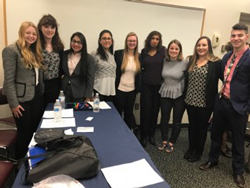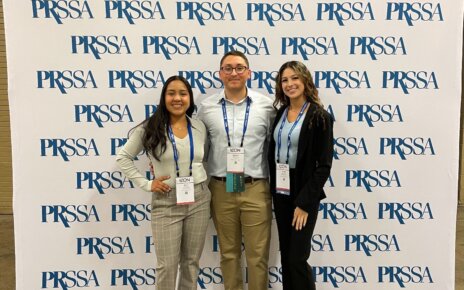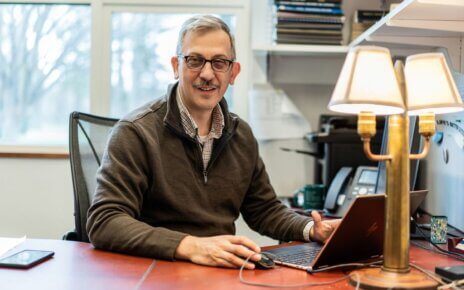The Academic Exchange Program (AEP) piloted the first ever integrated class at a maximum security prison in New Jersey, this fall. The directors and students of this program explored the significance of this experience while hosting a critical forum on the complications connecting educational and correctional institutions on Wednesday, Nov. 15.
Students enrolled in the “Investigating the School to Prison Pipeline 2” class will have spent 12 class periods this semester inside of the New Jersey State Prison, learning alongside incarcerated students. The curriculum of this two-part course was uniquely developed by the AEP Program Directors, Eleanor Novek, Ph.D., an associate professor of communication, and Johanna Foster Ph.D., the Director of the sociology department, and an associate professor of sociology.
Throughout the semester Monmouth and incarcerated students collaborated on a report on why prisons needed to be made more like schools, and schools less like prisons. Students gathered information and creatively responded to four major research questions: “How can we support at-risk youth and end zero-tolerance policies in public schools?,” “How can we understand the larger societal forces that limit support higher education and reentry preparations?,” and “How can we reduce the stigma of felon status and increase empathy for returning citizens?.”
“We broke down into groups in our class with the inmates at Trenton State, and we worked together to distribute a focus for each group to touch upon as far as what we felt the general public needs to know,” said Paul Matt, a senior communication student.“We need to listen and understand who they are, and how they got to prison based off of their upbringing, environment, and previous educational experiences. The purpose of education in prison is to teach the inmates what they haven’t been taught before in order to be a productive member of society.”
“This was ultimately to educate the students on the history of mass incarceration, institutional inequality, ethnic disproportional effects, and the politics of race, class, and gender in this culture,” said Foster.
Elizabeth Carmines, senior sociology student and School to Prison student said, “Dr. Novek and Dr. Foster were amazing to work with in the class. They were the perfect blend to keep us grounded and also fire us up about the topic. Both of them are so passionate about criminal justice reform, and they both have spent years devoted to influencing change in the system, which made them the perfect people to lead the class.”
Attendees of the forum included President Grey Dimmena, Esq., and Gary Lanigan, the commissioner of the prison, prison activists, lawyers for the incarcerated, students and faculty, and family members of the incarcerated students. The inside students were not permitted to leave the prison to participate in the event, but some family members in attendance were moved to tears.
“At the forum, one of [the inside student’s] mom and aunt came and it was really a heartbreaking thing for me,” said Erica Bogert, a senior communication student who took the course. “Her son has been incarcerated for decades and she cried to us at the end hoping for her son to come home. We cried with her because we knew her son as he is today, a kind, ambitious, and smart man, not the one who was incarcerated 20 years ago.”
Novek and Foster started their career together in 2013 when they were introduced by a fellow instructor at Monmouth, due to common interest in education inside of prison systems. Foster began her career in Bedford Hills Correctional facility, where she taught sociology to the incarcerated women. Dr. Foster also co-founded the College Bound Consortium, the first college program making efforts to provide NJ women in prison education, which has since developed into The New Jersey Scholarship and Transformative Education in Prisons Consortium (NJ-STEP).
“I am really proud of Monmouth for taking an enormous step in social justice and civil rights,” said Foster. “I see opportunity for Monmouth to do even more going forward, and our goal should be to offer academic credit to the students on the inside, just at it is earned by the students from Monmouth. As a private institution, Monmouth should consider fair exchange which would offer credits for the incarcerated students enrolled in the class, in exchange for the opportunity our students have had to learn inside of their facility. Without special arrangements with the prison, our University could not provide the students this educational opportunity.”
Co-director of the AEP program, Novek is the coordinator of the New Jersey sector of the Alternatives to Violence Project, an organization that spreads non-violence education to over 50 countries in the world. Novek has also taught in multiple prison facilities throughout the state. In 2015 Novek was awarded “Literacy Volunteer of the Year” by the New Jersey Department of Corrections for efforts to educate the incarcerated.
PHOTO TAKEN by Joy Morgan



